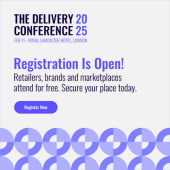DP DHL and UPS present innovative logistics and last-mile delivery solutions
.jpg)
Deutsche Post DHL and UPS are successfully developing innovative solutions to improve logistics and last-mile deliveries, senior executives told last week’s Leaders in Logistics Last Mile Delivery conference in London.
Among numerous innovations, the German logistics group has developed new route planning software to cut journeys dramatically, and recently tested digital locks for in-home deliveries and semi-autonomous delivery robots, said Clemens Beckmann, Head of Smart Cities and Last Mile Solutions at DHL Customer Solutions and Innovations.
“E-commerce volumes will double in Germany in the next decade but we cannot double the people. We must invest in technology as efficiency drivers for the (higher) volumes,” the long-serving innovations expert emphasised.
The new route optimisation tool, called the ‘Digital Delivery Graph’ (DDG) incorporates a wide range of information and data about city operating conditions, and enables DHL to do short-term route planning, with flexible delivery concepts and different time-windows for deliveries, he explained.
Using the DDG, DHL has achieved efficiency gains of 8-20% in tests, Beckmann told an audience of retailers, carriers and other industry players.
“DDG is a fundamental improvement for last mile deliveries. We will introduce it soon internally and I think we will probably also open it for external customers in perhaps 9-12 months,” he said.
DHL has also successfully tested digital ‘SmartLocks’ to enable in-home deliveries, Beckmann said. A trial with 150 households in Berlin resulted in 80% of participants saying they would continue to use the technology.
But the DP DHL executive made clear the group does not plan any widespread introduction of digital locks in the near future. “They are one possible solution. But the technology costs too much at present, and we don’t want to invest in beginner costs,” he said.
Another innovation is the PostBot, a semi-autonomous rolling parcel container that follows delivery workers to transport large and heavy items and which was successfully tested in the town of Bad Hersfeld.
“This could be an efficiency driver if it operates fully autonomously and helps solve the shortage of delivery staff. It could be like a mobile Packstation that consumers open to pick up their parcels,” he suggested.
However, Beckmann also highlighted the potential of alternative delivery points, such as postal retail outlets and parcel lockers, instead of home deliveries. For example, DHL drops off an average of 20 parcels per Packstation in Germany, he noted.
“Bundling effects and picking up parcels are the best solution. Our strategic goal is to persuade people to choose a postal retail outlet for delivery,” he commented.
The electric StreetScooter vans are another important technology for the future to help the group reach its target of zero emissions by 2050, and 70% ‘clean’ last-mile deliveries by 2025.
StreetScooters are more expensive than traditionally-fuelled vehicles but the group is investing for the future, Beckmann made clear. “If you think about a CO2 tax, then this (investment) will pay off more directly in the future,” he commented.
Meanwhile, UPS aims to help small retailers grow their online business by offering more flexible warehousing and logistics services through the new Ware2Go service, Chris Grubb, the company’s MD for B2B e-commerce strategy, told the conference.
Developed from an idea into a service in a “very fast” period of just six months, Ware2Go aims to overcome problems facing SMEs with existing warehousing options, he explained. Traditional 3PL models involve long-term commitments and are “inflexible”; marketplace fulfilment often has a ‘one size fits all’ approach with mixed inventory and high fees; while in-house warehousing is costly, small-scale and inflexible, he pointed out.
In contrast, Ware2Go is an “on-demand and flexible warehousing and fulfilment network” working with small regional warehouse operators to create a nationwide network and deliveries in one or two days. Customers benefit from an integrated and optimised logistics solution, warehouse operators gain new business, and UPS handles network management, inventory location and transportation, Grubb explained.
“This is only in North America at present but we see global applicability,” the UPS executive said. In response to questions, he added: “UPS is the carrier for Ware2Go but in time we will work with others. UPS does not want to handle everything.”


.png)